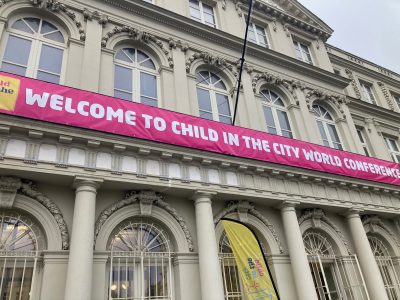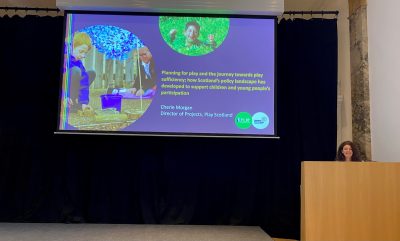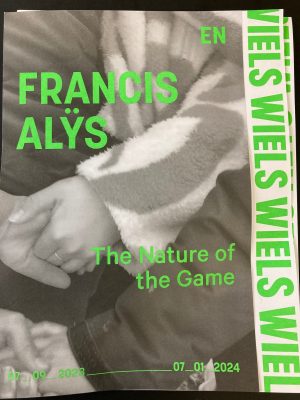I was delighted to be invited to Brussels to present on the progress Scotland is making in terms of children and young people’s engagement in developing and influencing planning policy. I was one of the many international speakers at the 11th Child in the City World Conference, representing Play Scotland as an advocate for play and discussing its pivotal role in shaping social justice for children. The Conference’s theme, “Building the Future,” resonates with Play Scotland’s commitment to ensuring that children have a rightful place in the urban landscape.

Play Scotland has been at the forefront of creating positive change, advocating for children’s rights, and actively participating in the development of child-friendly environments for 25 years. We have been instrumental in influencing policies that recognise play as a fundamental aspect of social justice and our initiatives aim to listen to and value the voices of children and young people in urban planning, allocate greater importance to public spaces for play, and secure ample resources, time, permission, and space for children to thrive through play.
I was able to share with the delegates some of the award-winning tools and resources that we have in Scotland for engaging with children and young people. Our experience in delivering Play Sufficiency Assessments with local authorities have given us good insight into how to effectively engage with children and young people to support them to assess the sufficiency of their local spaces, and give voice to their needs and hopes for play and recreation in their community. Through co-production of an engagement toolkit with diverse groups, we have gained valuable insights into the unique play needs of individual children and young people, enabling them to identify solutions that promote inclusivity and accessibility.
 The Place Standard Tools for children and for young people have been instrumental in assessing the quality of places and how they impact children and young people’s wellbeing. The tools were produced in partnership with A Place in Childhood and through engagement with children and young people and drawing on existing evidence and best practice, with the aim to highlight how children and young people interact with their environments. The tools assess places through the lens of 14 themes including play and recreation and nature and green space, and by promoting discussion, give a holistic view of the local area.
The Place Standard Tools for children and for young people have been instrumental in assessing the quality of places and how they impact children and young people’s wellbeing. The tools were produced in partnership with A Place in Childhood and through engagement with children and young people and drawing on existing evidence and best practice, with the aim to highlight how children and young people interact with their environments. The tools assess places through the lens of 14 themes including play and recreation and nature and green space, and by promoting discussion, give a holistic view of the local area.
Child in the City, who are an independent foundation, play a crucial role in bringing together professionals, academics, and advocates for children’s rights and their platform enables the exchange of research results and good practice. Their focus on strengthening children’s positions in cities aligns seamlessly with our objective and their commitment to translating children’s rights into local urban planning and fostering child-friendly environments mirrors our advocacy efforts.
As well as presenting at the event, I was privileged to hear from a wide range of speakers, each addressing crucial aspects of child-friendly cities, highlighting the collective commitment toward this cause with keynote speakers emphasising the need for educational environments that consider global care and sustainability, the importance of participatory planning involving children, and discussions on intergenerational cohesion and democracy. It is evident that the future of cities and other places rests upon acknowledging children not just as recipients of urban spaces but as active contributors to their design and function. Our collaborative efforts, as showcased in this conference, emphasise the urgency of creating cities where the wellbeing of children is a priority.
Play Scotland remains committed to this dialogue, ensuring that play is not only recognised as a fundamental right for children but also as a cornerstone of building a better, more inclusive world for the generations to come.
On a more playful note, one of the highlights of going to Brussels was visiting an exhibition entitled “The nature of the game” by Francis Alys, which was a joyful and compelling collection of films of children’s play around the world, including play in areas of conflict. Have a look at the artist’s website to see if there are any games you recognise!





